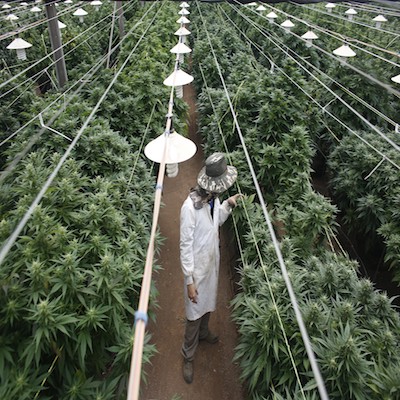An interesting piece worth reading…..
WASHINGTON – A Chinese immigrant is facing drug charges after two unrelated raids in New Mexico uncovered a marijuana processing operation, a network of purported hemp farms, and dozens of Chinese immigrants who had been laboring amid tons of marijuana.
The workers discovered in raids in October and November came from the Los Angeles area, Chicago and elsewhere. They had responded to help-wanted ads for agricultural work. Their presence in the flourishing marijuana industry illustrates what happens when the service jobs most often held by new immigrants evaporate in the pandemic, creating a situation ripe for exploitation of workers by recruiters and employers.
“Everyone is laid off from the restaurants,” one Chinese worker told Searchlight New Mexico, an investigative journalism website. “How else am I going to put food on the table for my family?”
Of the dozens of Chinese workers arrested in two raids, only one, Guoyun Liao, faces charges. They stem from a raid on October 8 in Farmington, New Mexico. Charges against the other workers were dismissed.
According to court documents reviewed by VOA, the charges recorded immediately after the raid include trafficking in controlled substances and conspiracy to commit distribution of a controlled substance. A pre-trial conference is scheduled for April 19 in the Farmington/Aztec District Court, according to court documents.
Liao’s attorneys did not return VOA’s request for comment.
New Mexico raid
Acting on a tip, local authorities raided a motel in Farmington, New Mexico, on October 8. Heavy-duty black plastic covered the floor of three rooms, with what appeared to be marijuana laid on top, according to the Albuquerque Journal. Authorities found marijuana spread on plastic tarps in four other rooms and more than 25 large trash bags filled with marijuana. A test by investigators confirmed it was marijuana, according to court documents.
Authorities seized the marijuana and they arrested 17 Chinese workers. Each of them possessed documents signifying they could work in the U.S.
Among them was Wei Wen, originally from China’s Guangxi province. Her jobs as a masseuse and elder caregiver ended as the pandemic overwhelmed the Los Angeles area. Needing work, she responded to ads on WeChat, a messaging app popular among Chinese immigrants. The ads promised $20 per hour for 10-hour days. “Who wouldn’t want to go?” said Wei.
She and other workers who spoke with VOA Mandarin said they were unfamiliar with marijuana and did not realize agricultural work might lead to arrest.
“I’m almost 60 years old,” she said. “It was my first time to get handcuffed. If my relatives in China knew this, I don’t know what they would think.”
In November, federal, state and tribal authorities coordinated an unrelated raid on a suspected illegal marijuana farming operation in Shiprock, New Mexico. From November 9-11, authorities found about 30 tons of illegal marijuana at 21 farms, according to a statement from the U.S. Attorney’s Office for the District of New Mexico.
Authorities also found dozens of Chinese immigrants, Chinese American citizens and Chinese asylum-seekers, all working on land belonging to the Navajo Nation.
The Chinese laborers worked on farms billed as cultivating hemp — a type of legal cannabis grown for its fiber and processed into over-the-counter health products. Hemp looks and smells just like marijuana but contains only traces of tetrahydrocannabinol (THC), a psychoactive that gives marijuana users a high.
But law enforcement suspected and found illegal marijuana plants under cultivation. The bust “yielded 30 tons of evidence,” according to the statement.
“Through the cooperative efforts of federal, tribal, state and local law enforcement partners, we have put a stop to a massive marijuana grow operation, which was being carried out under the guise of hemp farming,” said Kyle W. Williamson, Special Agent in Charge of the Drug Enforcement Administration’s El Paso Division. “The persons running this marijuana operation were doing so in disregard of tribal law, the health and well-being of tribal members, and the natural resources of the Navajo Nation.”
Use of land
Hemp farms are a source of local tension because they occupy land needed for cultivation of row corn, a staple food crop in the Navajo Nation.
The workers told authorities they had been sleeping on a greenhouse floor, subsisting on instant noodles and working 12-hour shifts, seven days a week. Many of the workers spoke little English. Many communicated they had not been paid.
The attorney general of the Navajo Reservation has charged Dineh Benally, the farms’ owner, with illegally operating marijuana farms. Benally, the former Navajo Farm Board president, has fled since the November raid, according to local press accounts, and he and his defense attorney have declined to be interviewed by the press.
The workers “were just skin and bones. They were essentially trapped on the farms with no way to leave. They didn’t speak English. They really had no idea what was happening or what to do,” Lynn Sanchez, program director at City of Albuquerque Anti-Human Trafficking Initiative, told Searchlight New Mexico.
“These people aren’t criminals. They are victims of labor trafficking,” Sanchez told VOA. Although she described the workers as trafficking victims, she said what had happened to them did not meet the criteria required for filing formal trafficking charges.
One of the elements of trafficking is forced fraud or coercion, Sanchez said. If asked, the workers would “probably say yes,” they were able to leave, she said. But given the geographic isolation, “there was no way for them to leave,” Sanchez said, suggesting the laborers were subtly forced to remain on site.
Authorities sent more than 30 Chinese workers to the local Shiprock High School where Sanchez waited with assistance.
“They were scared, of course, they were terrified,” she said.
“Some of them had tears in their eyes,” Sanchez said, adding that many workers provided her with evidence they held work permits.
Sanchez and her colleagues sent the workers to a hotel in Farmington where additional workers arrived throughout the evening.
The next day, employees from the Family Crisis Center of Farmington, which usually provides services for families fleeing domestic abuse, took the workers shopping for warm clothing. Sanchez gave them prepaid credit cards for their travel home to Los Angeles, Chicago, New York and elsewhere.
Sanchez learned of the October raid on November 20, when she was contacted by Nicole Hall, an assistant public defender who learned of the Chinese workers’ situation during a meeting with colleagues.
Hall, who does not represent any of the workers, told VOA, “I just knew right away that something was wrong and that none of these people should be going to jail.”
Charges
The day before Thanksgiving, the judge dropped charges against 16 workers stemming from the Farmington raid.
Liao still faces charges from the Farmington raid. He registered a total of 19 rooms at the motel, according to court documents seen by the Albuquerque Journal.
“What we know about human trafficking is the people at the top” don’t leave a money trail connecting them to illegal activities, said Sanchez, who is recognized as an expert in determining and assisting victims of human trafficking.
Authorities usually find an underling who makes arrangements, Sanchez said, adding that she believes Liao “was the one that the higher-ups made get the rooms.”
Read full article at https://www.voanews.com/usa/chinese-workers-turn-us-marijuana-industry-service-jobs-dry

















